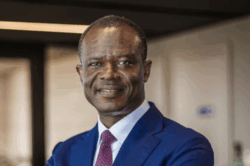…despite another DDEP impairment charge and loan write downs
…sets the foundation for dramatic profit increases from 2024 onwards
By Toma Imirhe
After posting its first ever financial loss in 2022 – a direct result of the dire effects of the recently concluded Domestic Debt Exchange Programme on the entire banking industry – Ecobank Ghana has returned to its usual profitable ways, reporting a sturdy GHS985.240 million pre-tax profit for the 2023 financial year. To be sure, Ecobank is still not quite where it should be with regards to net income, for the first time in decades not ranking among the five most profitable banks in the country. But most importantly not only has it completely overcome the financial performance challenges imposed by the DDEP, but it has leveraged those challenges to dramatically improve the most important aspect of its activities – the generation of revenues – while stymying cost increases, despite having to operate in the highest inflationary environment since the beginning of this century.
This presents the potential for an upward quantum shift in profitability from the 2024 financial year since the bank, has ruthlessly acknowledged all its losses, both real and potential, from the DDEP, potential Eurobond impairments and the inevitable rise in non- performing loans to companies and households due to the ongoing economic difficulties, writing them down during 2023.
Indeed, this meant that impairment charges in 2023 at GHS1,820.948 million were actually, higher than those of 2022 at GHS1,705.126 million, which had forced the bank into a GHS27.218 million pre-tax loss in that year. Added to this last year was a GHS937.762 million modification charge Coming from the fair value difference between its old government of Ghana local bond portfolio and the new bonds it received as part of the DDEP.
But the redeeming difference between last year and the previous one was that in 2023 Ecobank increased its net operating income by an astounding 79.1% to reach GHS5,325.207 million, up from GHS2,968.058 million generated in 2022. Conversely the bank kept the cumulative growth in its personnel and other operating expenses of GHS666.566 million and GHS824.668 million respectively down to just 22.7% (2022: GHS537.918 million and GHS669.702 million respectively).
Importantly, the growth in revenues and the contributions to profits by each of the bank’s operating units was broad based. Corporate banking – which handles global and regional corporations, the public sector, financial institutions, and international organizations, as well as local corporates with annual turnover of more than US$20 million – generated revenues of GHS1.5 billion in 2023, up 68% from GHS900 million in the previous year. Under corporate banking, loans and liquidity revenues rose to GHS249 million up from GHS135 million in the previous year. Trade finance revenues rose from GHS66million to GHS138 million, propelled largely from Ecobank’s market leading capacity in facilitating trade transactions under the African Continental Free Trade Area; and fixed income, currencies and commodities dealings for corporate clients also generated increased revenue of GHS166 million compared with 2022. But corporate banking’s star performer was cash management, with revenues from this activity increasing by 70% to GHS938 million, this contributing 62% of corporate banking’s entire revenues.
Commercial banking – which handles medium and small sized enterprises – revenues similarly surged to GHS996 million, marking a 50% increase compared to the previous year. This growth was propelled by a 72% rise in net interest income (NII) and a 10% increase in non-interest revenue. The significant boost in NII was attributed to higher interest rates, liability net revenue from funds, strategic business initiatives such as balance sheet optimization and deposit pricing management, as well as the expansion of relationships with both existing and new clients across various segments.
Consumer Banking in 2023 also delivered a remarkable financial performance generating revenue of GHS1.6bn, up from GHS1.198bn for 2022. Net-interest income experienced an impressive annual growth of 43% driven by sustained balance sheet growth amidst increased interest rates. Underlying profit before tax grew 42% on 2022 performance to GHS1bn, benefiting from curtailed net impairments (down 45%) and sustained cost discipline. The Consumer Banking business played a significant role in the bank’s overall performance, contributing 30% to the total bank revenue.
The reduction in net loan impairments from consumer banking illustrates just how important Ecobank’s current strategy of loan fragmentation is to its financial performance. Like virtually other banks in Ghana, non- performing loans in general have been on the rise since the beginning of this decade initially due to the effects of the COVID–19 global pandemic and its aftermath and subsequently Ghana’s own macroeconomic difficulties. Indeed, Ecobank’s NPL ratio, by the end of 2023 was 22.44% the highest in its three-and-a-half-decadeinstitutional history. But its fragmented retail lending is capping this particular challenge. Leading this drive is the bank’s digital micro-lending product, the Xpress-loan, created in collaboration with Jumo Ghana and MTN Mobile Money, which has now disbursed over GHS7.1 billion to over 3.5 million customers representing 10.9% of the Ghanaian population through 17.8 million loans. Interestingly 68% of all Xpress-loan clients were under 35 years and over 33.5% of them were women which underscores the bank’s support for women and youth. Just as instructively, of the total 3.4milllion customers, rural residents made up 38%.
Support to SMEs has intensified through the bank’s commercial banking activities which expanded its support to customers, resulting in a 19% increase compared to the prior year. This growth culminated in an asset size of GHS2.4 billion despite the loan repayments made in the year 2023.

But most important of all has been the effects of down-marketcustomer fragmentation on the bank’s deposits and consequently on its sheer balance sheet size, with total assets rising by 29.9% to GHS33,662.664 million by the end of 2023, up from GHS25,908.025 million a year earlier. It is instructive that this was driven by a near identical 29% increase in customer deposits to GHS26,338.790 million up from GHS20,423.861 million last year.
Importantly the bank has deliberately sought low-cost deposits such as current and savings accounts, particularly from its commercial and consumer banking customers rather than relatively high-cost fixed deposits. This strategy enabled net interest income to increase by a substantial 39.6% in 2023, to GHS3,520.873 million, up from GHS2,521.988 million in 2022.
Prudently however, in 2023 Ecobank sought to take advantage of the high yields on treasury bills and notes, as its NPL ratio rose and it was forced to restructure many still performing loans to sustain its borrowers’ financial good health. Consequently, while the overall loan book only increased marginally last year from GHS8,866.042 million to GHS9,517.709 million, its investments in securities rose considerably faster, from GHS6,743.075 million to GHS9,816.651 million. However, this still leaves Ecobank with the largest loan portfolios in Ghana’s banking industry even as it secures both customers deposits and shareholders’ equity investments.
It has also ensured that Ecobank remains eminently liquid in the aftermath of the DDEP and the ongoing macroeconomic challenges. Added to the increase in short term treasury securities the bank nearly doubled its cache of cash and balances with other banks during 2023 from GHS6,398.282 million to GHS11,256.764 million. As at the end of 2023 the bank had a sturdy liquidity ratio of 54.50%.
Underpinning the significantly increased balance sheet size are sharply increased shareholders’ funds. While stated capital remained at GHS416.641 million through 2023 (exceeding the statutory minimum capital requirement of GHS400million) the bank’s retained earnings rose to GHS1,678.134 million, its statutory reserve to GHS719.636 million, its credit risk reserve to GHS124.292 million and other reserves to GHS772.659 million. Cumulatively this increased total shareholders’ funds to GHS3,662.068 million, up from GHS2,705.795 million, a rise of 35.3%.
To overcome the huge impairment charges derived from government’s public debt restructuring and deteriorated customer loan quality as well as the modification charges imposed by the fair value difference of the old and new bonds exchanged under the DDEP, Ecobank has worked hard and ultimately very successfully to expand its customer base and both the volume and value of transactions it does for and with them. At the same time, it has ensured that its expenses have risen much more slowly.
This sets the stage for hugely increased profitability from 2024 since impairment charges will drop sharply and lower inflation will further slow growth in operational costs, but net revenues will keep rising on the back of a bigger balance sheet and more customers. This year Ecobank is sensibly refraining from paying a dividend, but shareholders will do well to understand that this sets the stage for unprecedented profitability – and accompanying possible decent dividend payouts – for the ongoing 2024 financial year.










